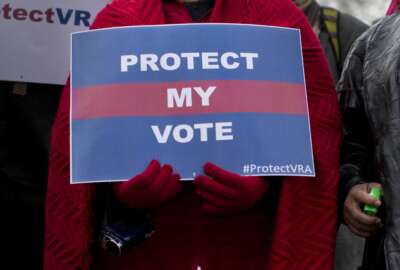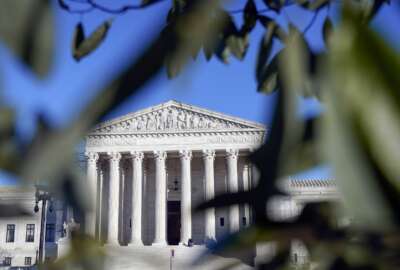Hubbard Radio Washington DC, LLC. All rights reserved. This website is not intended for users located within the European Economic Area.
How an upcoming Supreme Court decision will affect agency rulemaking
Federal employees, who make rules on behalf of their agencies, are wondering if the Supreme Court will change the ground rules. In Loper Bright Enterprises vers...
Federal employees, who make rules on behalf of their agencies, are wondering if the Supreme Court will change the ground rules. In Loper Bright Enterprises versus Raimondo, herring fishermen suing the Commerce Department basically said that Congress lets agencies go way too far. For some perspective, the Federal Drive with Tom Temin spoke with the Chairman of the Administrative Conference of the United States, Andrew Fois.
Interview Transcript:
Tom Temin And is it fair to say that agencies that do rulemaking and also ACUS itself are watching this pretty carefully?
Andrew Fois Yes. Agency certainly ACUS as well and academics and lawyers all across the country, because this has the potential for being an extremely significant case. Loper is one of two that the Supreme Court heard oral arguments on last week on Feb.17, along with a companion case called relentless. And both those cases posed the same issue, and the decisions in these cases will be amongst the most important of the term, if not in many years. If it wasn’t for the Trump cases, they clearly would be on top. Because the real issue at stake is something that’s known as the Chevron deference doctrine. And that’s an important doctrine not only in administrative law. It’s sort of the Miranda of the administrative law world, but it’s also one of the most significant cases in the law in general. What it basically is, it’s a power struggle between the judicial branch and the executive branch, with the Congress caught in between. And what the court is present with now is whether to reaffirm, modify or overrule Chevron entirely. And Chevron’s been around for a long time. It comes from a case called Chevron V. The Natural Resources Defense Council that was decided 40 years ago, in 1984, and has been cited by the Supreme Court over 100 times over the course of those 40 years.
Tom Temin But when you look at the case right now, specifically before the Supreme Court, herring fishermen were required to have a federal inspector aboard their boats for purposes of conservation and making sure that herring wasn’t overfished, I guess. But then the herring fishermen are obligated to pay for that person’s salary, which in some cases is higher than they pay the captain. I mean, isn’t that in particular, in the narrow sense is a pretty egregious overstep, maybe, of agencies authority?
Andrew Fois Well, it certainly is if you’re a herring fisherman. But sometimes the facts of a case or the decision in a particular case, who wins, who loses is not as important as what happens around the law. And in citing Chevron, in those cases, the lower courts said that the Commerce Department had the ability to issue those rules because of the way they interpreted their statute, the statute that was giving them the power. But the plaintiffs are saying, no way, that’s beyond your authority, and we need to move away from Chevron. So let me talk about Chevron for just a minute so we know what we’re talking about. It’s a doctrine that kind of oddly unlike most Supreme Court doctrines that comes sort of from the top down, this one sort of bubbled up from lower courts up. And it was really the late Judge Patricia Wald of the D.C. circuit, who named this the Chevron doctrine. As a doctrine developed, it established two steps, because the question is, does an agency have the authority to do what it wants to do under its statute? So the first step is to look at the statute itself, and in a Scalia like Textualist way, determine whether the statute is clear or not. And if it’s clear that the agency had the power to take the action that it did, then game over, agency wins. However, what do you do when the statute is unclear, ambiguous, confusing.
Tom Temin Which so many of them are.
Andrew Fois So many of them are, because that’s how Congress writes them, either intentionally to make political deals or are just saying, well, we can’t work out all the compromises here. Let the executive branch do it. That’s why I say they’re caught in the middle. So under Chevron, when the statute is ambiguous or unclear. The court will chip away a little of its own power and defer to the agency’s interpretation of that statute if it is reasonable. That means that even if the court thinks that the agency’s interpretation is wrong, the agency still wins if it’s reasonable. So that’s why agencies are so concerned about Chevron being overturned, because it would really take a bite out of the power they have vis-a-vis the courts.
Tom Temin We’re speaking with Andrew Fois. He’s chairman of the Administrative Conference of the United States. And we should probably say it may not affect ACUS that much because rulemaking, the process itself, would not change. It’s just the extent of the rules that agencies could propose is what would be limited.
Andrew Fois Yeah. And we get involved more in those procedures, those processes that the agencies use trying to help them to improve them across the board, regardless of what the legal rubric is around it, such as a doctorine like Chevron.
Tom Temin And we have seen cases in recent years where agencies were found by the court to overstep. I think there was an [Environmental Protection Agency (EPA)] rule on waters where people essentially successfully argued a little pond in my farm is not a waterway. The United States, it’s not connected to anything. It’s not going to pollute the Ohio River. And in which case the EPA was rebuffed, I think, by the Supreme Court. So there’s a little bit of precedent here.
Andrew Fois Yes. And that is one of the cases that have shown that the court has been slowly over the years, moving away from Chevron on its own without directly challenging it. And they’ve been taking up, as in that case, I think it’s West Virginia, the EPA, they’ve been taking up a new doctrine called the Major Questions doctrine, which is a little simpler. It’s just one question. If an agency is trying to do a really big thing, if the regulation involves a big deal, like what are the waterways of the United States, that would apply to a lot of water all over the country. In order for the agency to regulate a major question, the authority from the Congress has to be clear. You look at step one, it has to be clear, unambiguous, specifically granting the power to the agency when the stakes are high. Lot of room for wiggling still. What is, a major question, when are the stakes high? The court didn’t flesh that all out, but that will get flushed out over the years. So a lot of scholars and academics believe that that’s the way the court is going to head in these two cases is not necessarily overturn a 40 year old doctrine that a lot of people would be upset about under starry decisis. The government argue that this would upset how things have been done for 40 years.
Tom Temin Sure, but in those 40 years, look at how much the administrative state, if you want to call it that. And I’m trying not to make a political judgment here, but that’s just a term that’s convenient. Tens of thousands of pages, hundreds of thousands of pages of regulation. And you mentioned this is a power struggle between the courts and the executive branch. I wonder, could it be also looked at as perhaps the court trying to impose on Congress some discipline, over which the Congress has seemed to have no discipline for the past 40 years?
Andrew Fois Yeah, absolutely. And that’s why I said the Congress is caught in the middle. Both branches are saying give us more direct authority or more quickly, but the courts particularly but even then, the courts are chipping away a little bit of their own authority, because traditionally it’s been the court’s job to say what the law is.
Tom Temin I think there was a justice once that said, the law is what we say it is.
Andrew Fois Yes. Right. Exactly.
Tom Temin I forget which justice it was.
Andrew Fois Yeah. I don’t remember either, but whether the statute is ambiguous or clear, courts traditionally make those decisions. But under Chevron and now major questions, they are encouraging the Congress to perhaps do something that is not all that easy or even possible to do, and that’s to make these statutes clear so that agencies understand what their authority is.
Tom Temin Well, let’s propose then. Suppose the Supreme Court does overturn the Chevron deference in its decision. We don’t know what it’s going to decide. It seems to be leaning that way based on the questioning that was heard. And in the absence of any new laws being written in the interim, what do you think the practical effect will be for agencies, for EPA, for Commerce, for the rule making major agencies?
Andrew Fois It’s going to take the effect of reining them in. Frankly, that will be something that the Biden administration or any Democratic administration would be very concerned about. Because when you can’t get legislation through Congress, the next thing to try to do is to regulate it. But the politics of this and how agencies feel and observers feel about it, really kind of has flip flop over the years. In the 1980s, when Chevron first came down and the Reagan administration was in power, they just love Chevron. We get to do the non regulating or the regulating and our way that we want to do. But then it flipped over the years. And when Democrats became in power, then liberals switched positions and began to be big supporters of Chevron where they had opposed it during the early 80s. And yeah, as you said, the administrative state such as it is, people call it that. Some people don’t like that name. But that’s certainly true that there are more agencies and there are more regulations, by factors in factors exponentially than there used to be. But without Chevron, I think you’re going to find more of an effort to work things out between the executive branch and the Congress.
Tom Temin Yes. And ultimately, you could look at regulation as existing in a tension between liberty and the fact that we have a very crowded and complex society. And what someone does has a lot of effect on other people, which may not give them the right to have that effect. Therefore, you need regulation to have ground rules so we can live together. And again, liberty on the other side. And there is really no right answer. It’s constant.
Andrew Fois It’s a balance. Yeah, it’s a constant balance. And in the simple case of herring fishermen, they don’t want people looking over their shoulders, much less people that they have to pay to look over their shoulders. And for the rest of us, it’ll mean more expensive herring.
Copyright © 2024 Federal News Network. All rights reserved. This website is not intended for users located within the European Economic Area.
Tom Temin
Tom Temin is host of the Federal Drive and has been providing insight on federal technology and management issues for more than 30 years.
Follow @tteminWFED





